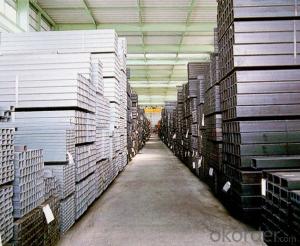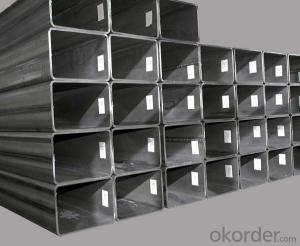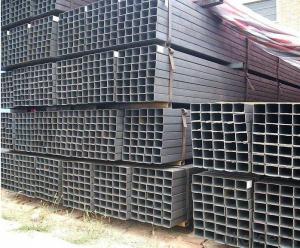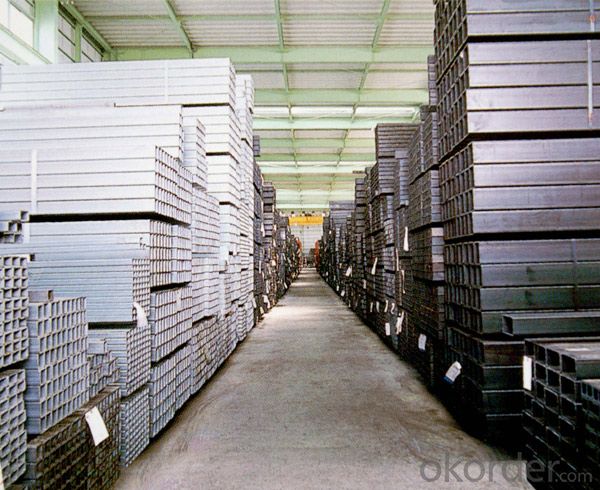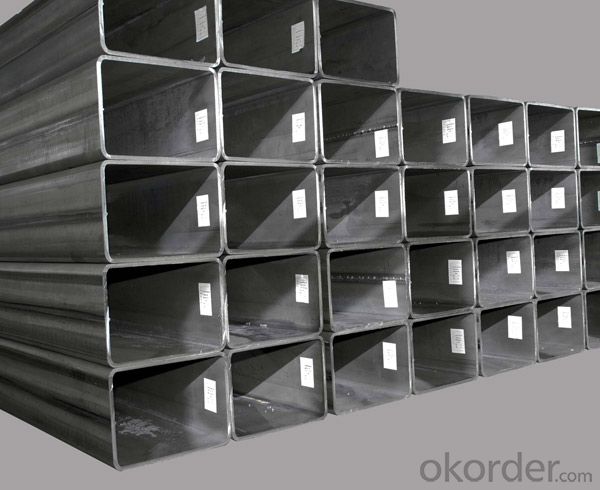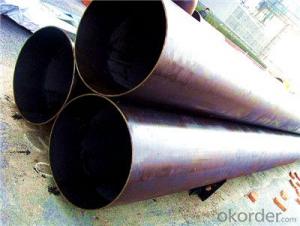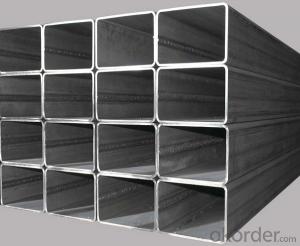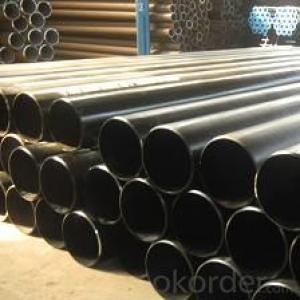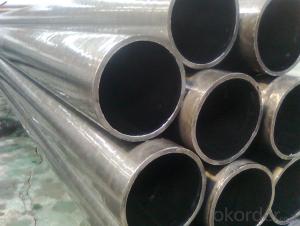Hollow Section-Square Pipes With High Quality
- Loading Port:
- Tianjin
- Payment Terms:
- TT OR LC
- Min Order Qty:
- 25 m.t.
- Supply Capability:
- 10000 m.t./month
OKorder Service Pledge
OKorder Financial Service
You Might Also Like
Carbon ERW Welded Pipes-Square Tube And Pipe For Furniture ASTM A53 Hollow Section Details:
| Minimum Order Quantity: | 50MT | Unit: | m.t. | Loading Port: | China Main Port |
| Supply Ability: | based on order | Payment Terms: | TT or L/C |
Product Description:
1. Specification of ERW Welded Pipes-Square Tube and Pipe for Furniture ASTM A53 Hollow Section
1) Application: Greenhouse pipes, scaffolding pipes, transportation the ocean oil and gas, mechanical tube of ocean platform, power station, chemical industry and building, construction foundation piles, steel structure building, for low-pressur fluid service, steel structure bridges etc.
2) Standard: ASTM A53, BS1387, GB/T9711, GB/T39013
3) Steel Grade: Q195/Q215/Q235/Q345
2. Sizes of ERW Welded Pipe- Square Tube and Pipe for Furniture ASTM A53 Hollow Section
Outer Diameter: 1/2"x1/2"-16"x16''
Thickness:4.0-12.75mm
Length: As costumer's requirement
2. Packing & Delivery
Packing Detail: Packing in bundle with steel strips;with seaworthy package at the end; could be done with your requirement
Delivery Time: Within 30 Days after the reception of prepayment or L/C
3. Data Sheet
Standard: ASTM A53
Mechanical Properties
Standard | Grade | (MPa) | (MPa) |
Yield strength | Tensile Strength | ||
ASTM A53M | A | 205 | 330 |
B | 240 | 415 |
Chemical Composition(%)
Standard | Grade | C | Mn | P | S | V | Ni | Cu | Cr | Mo |
Max | Max | Max | Max | Max | Max | Max | Max | Max | ||
ASTM A53M | A | 0.25 | 0.95 | 0.05 | 0.045 | 0.08 | 0.4 | 0.5 | 0.4 | 0.15 |
B | 0.30 | 1.20 | 0.05 | 0.045 | 0.08 | 0.4 | 0.5 | 0.4 | 0.15 |
- Q: Seamed steel pipe seamless steel pipe, carbon steel pipe, galvanized pipe, four how to distinguish between
- Welded and seamless steel pipe is divided according to the processing form, usually welded seam steel tube, seamless steel tube drawing and hot two ways, carbon steel is material, galvanized pipe is welded pipe production after the surface is galvanized
- Q: How are steel pipes used in the telecommunications network infrastructure?
- Steel pipes are commonly used in the telecommunications network infrastructure as a means of protecting and housing underground cables. These pipes provide a durable and secure pathway for the cables, safeguarding them from environmental factors such as moisture, extreme temperatures, and physical damage. Additionally, steel pipes offer excellent strength and rigidity, allowing for the installation of multiple cables within a single pipe, thereby reducing costs and simplifying maintenance.
- Q: What are the different methods of transporting steel pipes?
- There are several methods of transporting steel pipes, including by truck, train, ship, and pipeline.
- Q: How are steel pipes used in the manufacturing of oil refineries?
- Steel pipes are used extensively in oil refineries for various purposes. They are primarily used for transporting crude oil, refined petroleum products, and various chemicals within the refineries. These pipes are also crucial for the distribution of water, steam, and other fluids required for the refining processes. Additionally, steel pipes are used in the construction of various equipment and structures in oil refineries, including storage tanks, heat exchangers, and process units. Overall, steel pipes play a vital role in ensuring the safe and efficient operation of oil refineries.
- Q: Can steel pipes be used for conveying hazardous chemicals?
- Yes, steel pipes can be used for conveying hazardous chemicals. Steel pipes are known for their high strength and durability, making them suitable for handling various substances, including hazardous chemicals. They can withstand high pressure and temperature, ensuring the safe transportation of these chemicals. Additionally, steel pipes have excellent resistance to corrosion, which is crucial when dealing with corrosive and potentially dangerous substances. Moreover, steel pipes can be easily welded and connected, allowing for a secure and leak-proof transport system. However, it is important to consider the specific requirements of the chemicals being transported and ensure that the steel pipes are properly designed, coated, and maintained to prevent any potential risks or reactions with the hazardous substances.
- Q: Are steel pipes suitable for hydronic heating systems?
- Yes, steel pipes are suitable for hydronic heating systems. Steel pipes are known for their durability and strength, making them a reliable choice for transporting hot water or steam in a hydronic heating system. They can withstand high temperatures and pressures, ensuring efficient heat transfer throughout the system. Additionally, steel pipes are resistant to corrosion, which is important in preventing leaks or damage to the pipes over time. However, it is essential to properly insulate steel pipes to minimize heat loss and improve energy efficiency in the hydronic heating system. Overall, steel pipes are a popular and suitable option for hydronic heating systems due to their reliability, durability, and ability to handle the demands of heating water or steam.
- Q: Can steel pipes be used for hydropower generation?
- Yes, steel pipes can be used for hydropower generation. Steel pipes are often used in the construction of hydroelectric power plants to transport water from a higher elevation to lower areas, where the water's kinetic energy is converted into mechanical energy to generate electricity. The durability and strength of steel pipes make them suitable for this purpose, as they can withstand the high pressure and flow rates of water in hydropower systems.
- Q: Is the electric pipe used with steel pipe or PVC pipe?
- When the electric wire pipe is laid, the steel pipe can be adopted, or the plastic pipe can be adopted, but the steel tube must not be used in the ceiling. The standard explanation is for rat bite.
- Q: What is the difference between steel pipes and concrete-lined pipes?
- The main difference between steel pipes and concrete-lined pipes lies in their composition and protective features. Steel pipes are typically made entirely of steel, providing strength and durability. On the other hand, concrete-lined pipes consist of a steel pipe coated with a layer of concrete. This lining offers additional protection against corrosion and abrasion. While steel pipes are more suitable for high-pressure applications and offer better resistance to external factors, concrete-lined pipes are commonly used in wastewater systems to prevent corrosion and extend the lifespan of the pipe.
- Q: How are steel pipes used in the petrochemical industry?
- Steel pipes are commonly used in the petrochemical industry for various purposes such as transporting and distributing fluids and gases, as well as providing structural support for equipment. They are particularly preferred due to their high strength, durability, and resistance to corrosion, making them suitable for handling harsh and corrosive substances.
Send your message to us
Hollow Section-Square Pipes With High Quality
- Loading Port:
- Tianjin
- Payment Terms:
- TT OR LC
- Min Order Qty:
- 25 m.t.
- Supply Capability:
- 10000 m.t./month
OKorder Service Pledge
OKorder Financial Service
Similar products
Hot products
Hot Searches
Related keywords
